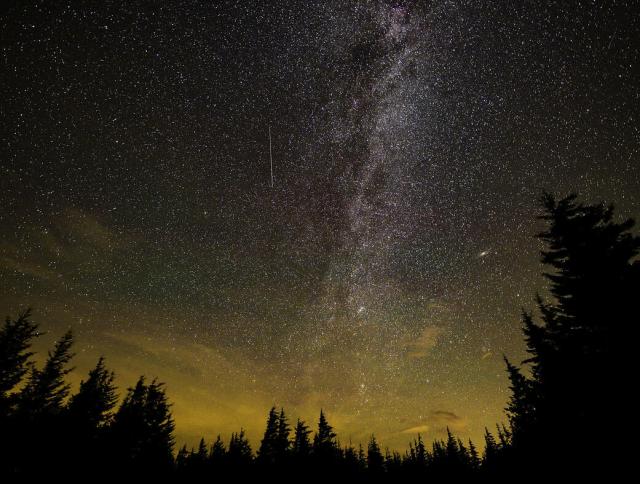Over 80% of the world’s population & 99% of Americans & Europeans live under "sky glow," where light pollution affects wildlife, human health & our ability to observe celestial objects.
As we lose the chance to look up & peer back in time at once vivid stars, we risk forgetting our place as a single species in the magnificent symphony of life. education.nationalgeographic.o… #space #science #nature #SharedPlanet
Light Pollution | National Geographic Society
People all over the world are living under the nighttime glow of artificial light, and it is causing big problems for humans, wildlife, and the environment. There is a global movement to reduce light pollution, and everyone can help.education.nationalgeographic.org
This entry was edited (2 years ago)

Osma A 🇫🇮🇺🇦
in reply to Sheril Kirshenbaum • • •Light pollution map
www.lightpollutionmap.infoMartin Vermeer FCD
in reply to Sheril Kirshenbaum • • •Robert Pickering
in reply to Sheril Kirshenbaum • • •Rémi Dupré
in reply to Sheril Kirshenbaum • • •nedhamson
in reply to Sheril Kirshenbaum • • •Dandydan
in reply to Sheril Kirshenbaum • • •Than that feeling of being watched by a mountain lion.
David P
in reply to Sheril Kirshenbaum • • •the only good thing about camping far from civilisation is the dark sky, and the view of the heavens.
At least, that's what I choose to remember most about my otherwise crap trip to Fraser Island (off Queensland coast, now known as K'gari).
#stargazing
Andy Tasker
in reply to Sheril Kirshenbaum • • •Pete
in reply to Sheril Kirshenbaum • • •Franz
in reply to Sheril Kirshenbaum • • •Franz
in reply to Sheril Kirshenbaum • • •Bmorekarl
in reply to Sheril Kirshenbaum • • •Annietime
in reply to Sheril Kirshenbaum • • •SFCeleste
in reply to Sheril Kirshenbaum • • •jayrawd48
in reply to Sheril Kirshenbaum • • •MarkR
in reply to Sheril Kirshenbaum • • •British Tech Guru
in reply to Sheril Kirshenbaum • • •Enoch
in reply to Sheril Kirshenbaum • • •Studio Beau
in reply to Sheril Kirshenbaum • • •Peter Lichota
in reply to Sheril Kirshenbaum • • •chaase
in reply to Sheril Kirshenbaum • • •Mike from Before
in reply to Sheril Kirshenbaum • • •Dean
in reply to Sheril Kirshenbaum • • •PurpleWitch
in reply to Sheril Kirshenbaum • • •Myria
in reply to Sheril Kirshenbaum • • •Sherri
in reply to Sheril Kirshenbaum • • •Kristoffer Lawson
in reply to Sheril Kirshenbaum • • •NoctisEqui 🇺🇦🇵🇸🇪🇹🏳️🌈
in reply to Sheril Kirshenbaum • • •Rishikesh
in reply to Sheril Kirshenbaum • • •Its Gregory
in reply to Sheril Kirshenbaum • • •Coffee Pinewood
in reply to Sheril Kirshenbaum • • •jujube
in reply to Sheril Kirshenbaum • • •Vihio
in reply to Sheril Kirshenbaum • • •One of the results of this wretched postmodernism where it seems that only material goods count. So we are overwhelmed by them, they soon become rampant garbage and in the meantime we miss the wonders of nature.
#dystopia
youtu.be/AlVczvB4FQk
Soylent Green Opening Titles
YouTubeSheril Kirshenbaum
in reply to Sheril Kirshenbaum • • •There’s more on losing the stars today from @sciencemagazine & the news isn’t encouraging:
“Light pollution is drowning the starry night sky faster than thought” science.org/content/article/li… #space #svience #nature /2
Science | AAAS
AAASCyrus Harmon
in reply to Sheril Kirshenbaum • • •John J. Dziak
in reply to Sheril Kirshenbaum • • •Manuel Royal
in reply to Sheril Kirshenbaum • • •Sheril Kirshenbaum
Unknown parent • • •@sciencemagazine @dpnash I remember being filled with a sense of wonder by the night sky as a child/teen in the 80s & 90s at my parents house. It doesn’t look like that anymore.
I was in Tasmania last week & it served as a beautiful reminder of what’s really up there. I suspect if more of us could experience that, we’d remember our connection to the natural world & just maybe, we’d do more to protect it.
Lord Kelvin
in reply to Sheril Kirshenbaum • • •Dan Neuman 🇨🇦
in reply to Sheril Kirshenbaum • • •